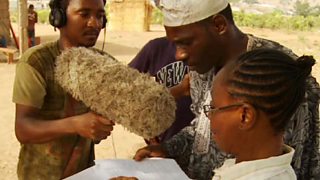"It's boring!" "How do you do it?" "I couldn't be a researcher!" Just a few of the comments which I sometimes hear from my friends and colleagues about my profession. But my reply is simple: "It's as interesting and rewarding a job as anyone can hope for."
For example, just one fascinating part of my job has been discovering how our long-running radio drama Story Story affected people's perceptions and actions in the run-up to the latest general elections in Nigeria. Story Story has been on air since 2004. Set in a motor park, it uses drama in an entertaining way that reflects the everyday realities of Nigerians to trigger awareness and discussion about important social issues such as how citizens are governed.Β As one listener in a rural part of Akwa Ibom state put it: "It is what is happening in real life that they are acting. Reality is what they are acting."Β

A recording of Βι¶ΉΤΌΕΔ Media Action's Nigerian radio drama Story Story.
We used various forms of research from number crunching large-scale surveys to collecting stories in qualitative settings. Our job as researchers was to explore the effect of the USAID-funded series of Story Story on people before and during Nigeria's April 2011 elections. One method saw us visit three listening groups which met weekly over a whole year. Over their year together, these listening groups became closely knit; driven, in my opinion, by a hunger for knowledge and desire for better lives. And from them, we very quickly heard some inspiring stories of individuals voting for the first time and voting for candidates of their choice.
A member of one of the listening groups told us: "Story Story changed my life during the past election. Before [I heard the show], I said I would not register or vote for anyone because [I thought] even if I voted for my candidate he might not win. When I listened to the programme Story Story, they said we should all come out, vote and 'guard' our vote. [I learned that] our vote will be counted in front of us and we can hear the result before we leave. When I heard this, it encouraged me to come out and vote."
In addition to the weekly listening groups, we also brought together listeners on a one-off basis to discuss the impact of the drama on their lives. One listener in Lagos told us that his experiences before listening to the show was that his vote could be easily bought: "Politicians would just tell me, 'Okay, vote for so and so person'. And maybe a night before we vote, we go to a joint, we drink and I have to vote for them because they've bought me some bottles of beer."
But, after listening to Story Story, our listener says he understod the power of his vote: "Since I’ve been listening to [Story Story], I think I would never do that again. I would vote for who I want to vote for." Another listener in a rural area of the Federal Capital Territory said: "Yes, it has increased my understanding. I don't normally vote but this time after listening to Story Story I voted."
Seemingly small fragments of information can quickly yield interesting stories of impact that helps us monitor and evaluate the work we do. And this drives my passion for research. Such changes are sometimes subtle, sometimes anticipated, but sometimes quite unexpected and extraordinary.
Related links
